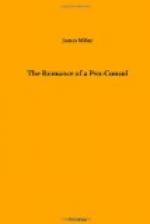’Dreaming dreams! I trust that Englishmen will never cease to do that, for otherwise we should be falling away from ourselves. To dream is to have faith, and faith is strength, whether in the individual or in the nation. Sentiment! Yes, only sentiment must remain, probably, the greatest of human forces governing the world.’
The store, reflected in Sir George’s eyes, was what gave him his control over men. In those depths, blue as a summer sky, were many lights, which caught Robert Louis Stevenson and were comprehended of him. The return observation was, ’I never met anybody with such a bright, at moments almost weird, genius-gifted eye, as that of Stevenson.’ Sir George could fire imagination in the most ordinary mortal, carrying him off into enchanted realms. He sailed to strange skies, a knight-errant of a star, and he could tow the masses with him. He lifted them out of themselves, and put a label on their vague yearnings. They had imagination, the instinct upward, and were grateful to have it discovered.
The poetry of Sir George’s nature flavoured his language, alike in manner of delivery and turn of phrase. It had a quaint old-world style; it fell slowly, in a low, soothing voice. He might have spent his, days in the cloister, rather than in the din of hammering up hearths for the Anglo-Saxon. Perhaps it was that he had talked so long to the hills of Oceana, catching their simplicity and music. You were reminded of the measured English of an old and lovable book, just as you grew used to read in his face what he was to say, before the words had begun to flow. Never was there a face more quick to reflect the mind, more pliable to humour, more luminous at some stirring idea or deed, more indignant at the bare notion of a wrong inflicted, softer at the call of sympathy.
Sir George had travelled to Windsor with the Earl of Rosebery, then Prime Minister, and that was an agreeable memory. Being asked what characteristics he noted as most prominent in the Premier, he replied: ’Oh, his extraordinary readiness at seeing the humorous side of anything, his almost boyish love of fun. He seems to have a power of dismissing the weight of public affairs, of diverting himself with the playfulness of youth.’ Sir George was living in Park Place, St. James’s, and on returning from Windsor the Premier drove him there. His rooms were at Number 7, and here the street ended in a sharp incline, with somebody’s yard beyond.
Sir George suggested that the coachman should stop, and let him down at a point where the horses could readily turn. ‘Not at all,’ Lord Rosebery insisted, ‘I’ll drive you to the door and we’ll manage to turn somehow.’ A trifle anxious, Sir George waited on his door-step to see how this was to be done.
‘Quick of eye,’ he related, ’the coachman discerned the possibilities of the yard at the top of the incline. Accordingly, he whipped into it, wheeled round, and trotted gently away past me. There sat the Premier in the carriage, waving his hat in a triumph, the fun of which quite infected me.’




